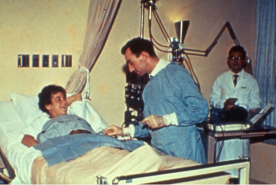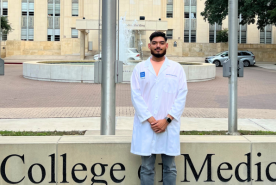Last Updated: September 23, 2024
Medically reviewed by NKF Patient Education Team
Living Donor Surgery
Living donor surgery, also known as a living donor nephrectomy, is when a surgeon who specializes in abdominal transplant surgery removes a kidney from a living person who makes the decision to donate their kidney to someone in need.
The surgery usually takes three to four hours. Before your surgery, the transplant doctors will numb your belly area, known as a pain block, that will last twelve to twenty-four hours. This helps to reduce the amount of pain you’ll be in and also helps to reduce the amount of pain medicine you’ll need right after surgery.
Two Types of Living Donor Surgery
There are two main types of living donor surgery:
- Laparoscopic nephrectomy
- This involves the use of a laparoscope (wand-like camera) that is passed through two to three small incisions or “ports” in the abdominal wall (belly area.) It helps the surgeon to see inside the area where the organs are to remove the kidney.
- Robotic nephrectomy
- This is similar to laparoscopic donor nephrectomy. After making several small incisions (cuts), a surgeon will remove the donor’s kidney by controlling the arms of a robot through a computer (instead of using their own hands for the actual operation). They use a camera on the robot that can see inside the body with a better view of the blood vessels (artery and vein), and ureter (the tube that connects the kidney to the bladder). Then, they remove the kidney through a small incision (cut) either along the bikini line or below the belly button.
Benefits of both of these types of surgeries are a shorter recovery time, shorter hospital stay, small incisions, and few potential issues after surgery.
Your transplant team will talk to you more about the types of surgeries they do at their center.
Risks of Living Donor Surgery
The surgery involves the same level of risk for the donor as any other major surgery. The majority of complications after surgery are minor but might lead to having a longer hospital stay, depending on the issue. Your transplant team will talk to you about the risks of surgery at your evaluation and will be able to answer any questions that you have. These risks include:
- Pain. You will receive a pain block before surgery to numb your belly area for twelve to twenty-four hours. Your transplant team will talk to you about the different pain medications that they’ll give you after surgery.
- Infection. An infection can delay the healing process, cause scarring or other problems. If the area near where your kidney was removed becomes infected, it will be treated with antibiotics. Antibiotics are powerful medicines that fight bacterial infections.
- Pneumonia. Surgery increases the risk for pneumonia (swelling of the lungs caused by bacteria or a virus). You will be asked to cough and breathe deeply during your recovery period. Taking a deep breath and coughing forces air to the bottom of your lungs, which helps to expand them and lessens your risk for pneumonia.
- Damage to the kidney. There is a small possibility that your donated kidney could become damaged during surgery. Every attempt will be made by the surgical team to lessen the chance of this happening.
- Blood Clotting. You will be encouraged to move around by standing up or taking a short walk as soon as you can after surgery. This will help the blood in your body keep moving to help prevent blood clots.
- Urinary tract infection (UTI). Having a urinary catheter placed to allow you to urinate (pee) during surgery increases your chances of having a UTI. This is an infection of the bladder or kidneys that can easily be treated with antibiotics.
- Developing a hernia. There is a chance you can develop a hernia if you lift anything too heavy after surgery. You’ll be asked to not lift anything heavier than a jug of milk for 4-6 weeks after donation. A minor, routine surgery can help fix a hernia if one develops.
- Allergic reaction to anesthesia. Anesthetics are drugs that put people to sleep for major surgeries and prevent pain. During your evaluation or at your pre-op appointment, which happens one to two days before surgery, the transplant team will ask you if you’ve been under anesthesia for any other surgeries and will try to identify any allergies that you might have.
- Death. There is always a risk of death with any major operation. However, the risk of death from surgery for living kidney donors is very low. Research has shown that less than 1% of people who donate die from issues related to donation. You’ll have a lot of testing and talk with the team during evaluation to make sure you are healthy enough for the surgery. Every step will be taken to prevent any harm to your health after you donate.
If You Have Concerns about Surgery
It is normal for you and your family to have concerns about the surgery. You should speak openly with your transplant team about any concerns and ask questions if you have any. You should also learn the risks of surgery in addition to long-term risks of living donation. All conversations and medical test results will be kept private between you and the transplant team.
Some potential donors also like to speak with their faith leaders or other people who have already donated to hear their experience. You can ask your transplant center to connect you with someone who has donated at their center, or you can contact NKF Peers to talk one on one with a living donor.
Recovering from living donor surgery
You’ll stay in the hospital one to two nights after surgery. Your team will encourage you to stand up or take a short walk while you’re in the hospital. It’s important to remember that everyone is different and how long it takes to recover is different for each person.
After leaving the hospital, you might feel tenderness, itching, and some pain as your incisions heal. You might also feel tired for a few weeks and have some discomfort from the air or gas that you’ll receive during surgery that allows the surgeons to see better inside your body to remove the kidney. It is common for people to have some shoulder pain after donating as any gas that is left over moves up their body.
Follow-up After Surgery with the Transplant Team
After your surgery, the transplant team will have you come in for follow-up appointments to make sure you’re feeling well and staying healthy. If you live far away from the transplant center, you can ask to do these visits virtually on your smartphone or computer. You can expect to have appointments:
- 2 weeks after donating
- 6 months after donating
- 1 year after donating
- 2 years after donating
Life after donating a kidney
After you recover from living donor surgery, you’ll be able to return to the lifestyle that you had before donating, including physical activity like exercising and playing sports. You won’t need to change what you eat and drink, but are encouraged to eat a well-balanced diet. You also won’t need to be on any long-term medication because you donated a kidney.
Questions for your Healthcare Team
- What type of surgery will I have if I donate?
- What kinds of problems or complications are most common in patients like me?
- Who can I talk to if I have concerns or questions about the surgery?
- Can you connect me with a living donor who has donated at this center to hear about their experience?
More resources
- Talk to someone who’s donated | NKF Peers
- Ask questions and get help finding a transplant center | NKF CARES
- About Living Kidney Donation PDF


















